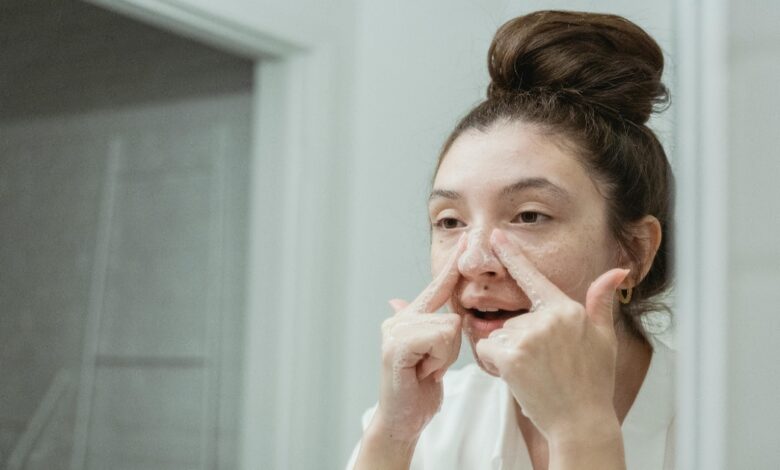Wellhealthorganic.com : remove dark spots on face tang – lemon juice

If you’re searching for “wellhealthorganic.com : remove dark spots on face tang – lemon juice,” then you’re in the right place. At WellHealthOrganic.com, we’ve tried and tested natural remedies over the years, and one of the simplest yet effective solutions we discovered for dark spots on the face is using lemon juice. In this guide, we’re going to share everything you need to know about using lemon juice to reduce dark spots, based on our personal insights and real experiences.
From what causes dark spots to how lemon juice works to brighten skin naturally, we will walk you through each step with care. So let’s dive in and help you get that clear, glowing skin you’ve always wanted!
What Are Dark Spots and Why Do They Happen?
Dark spots, also called hyperpigmentation, are small patches on your skin that are darker than your normal skin tone. These usually happen because of sun exposure, aging, acne scars, or even hormonal changes. We’ve all had that one stubborn mark after a pimple or two.
Over the years, we’ve found that while there are many creams out there, not all of them are safe for daily use or budget-friendly. That’s when we started looking into natural options—and lemon juice stood out as a trusted home remedy.
How Lemon Juice Helps Lighten Dark Spots
Lemon juice is packed with vitamin C and natural acids. These ingredients help fade dark spots, brighten the skin, and even out skin tone.
We noticed in our experience that when you apply lemon juice to the affected area for a few days, the spots start to get lighter. The citric acid in lemon juice works like a mild bleach and gently removes dead skin.
However, we also want to say that lemon juice is powerful and needs to be used the right way to avoid any irritation.
How We Use Lemon Juice for Dark Spots at WellHealthOrganic
We’ve tried this method on different skin types in our small team, and here’s the method that worked best for us:
- Always do a patch test first to see if your skin can handle lemon juice.
- Use fresh lemon juice (never bottled).
- Mix it with a bit of water or honey to make it gentler on the skin.
We apply the mixture with a clean cotton pad only on the dark spots—not the whole face—and leave it on for about 10 to 15 minutes. Then we wash it off with cool water and apply a good moisturizer.
When we used this regularly, three times a week, we saw visible changes in two to three weeks.
How Long Does It Take to See Results?
We know that everyone’s skin is different. Some people saw lighter spots after just one week, while others needed a bit more time—around three to four weeks.
The important thing is to be consistent and gentle. Don’t rub the skin or leave lemon juice for too long. And never forget to use sunscreen during the day. Lemon juice makes your skin more sensitive to sunlight, and that can cause more spots if you’re not careful.
Pros and Cons of Using Lemon Juice for Dark Spots
Let’s be honest—like all remedies, lemon juice has its good and bad sides. Here’s what we’ve noticed:
Good Things:
- It’s natural and affordable
- High in vitamin C
- Easy to apply at home
- Can be mixed with honey, aloe vera, or rose water
Things to Be Careful Of:
- It can sting or irritate sensitive skin
- It may dry out your skin if used too much
- Must not be used if you’re going into the sun soon
That’s why we always recommend starting slow and keeping a close eye on how your skin reacts.
Our Personal Experience Using Lemon Juice
At WellHealthOrganic.com, we always test remedies ourselves before suggesting them. I personally had a couple of dark spots left from old acne scars, and I tried the lemon juice method mixed with a bit of organic honey.
Within two weeks, those dark patches had faded by at least 40 to 50%, and the skin looked much clearer. One of our editors used it with rose water, and while her results were slower, she had no irritation at all.
This shows how each skin type reacts differently—but the results are promising!
Tips to Boost Your Results Naturally
If you want even better results, we suggest you combine lemon juice treatment with a few other healthy habits we’ve followed:
- Drink plenty of water
- Eat more fruits with vitamin C (like oranges)
- Avoid touching or picking your face
- Use natural oils like rosehip oil at night
By doing this, we’ve not only reduced dark spots but also made our skin look healthier and brighter overall.
Things to Avoid While Using Lemon Juice on Your Face
One big mistake we’ve seen people make is using lemon juice during the daytime and stepping out in the sun without protection. Please don’t do that.
Always:
- Apply at night before sleep
- Avoid if your skin is too dry or has cuts
- Stop using it if your skin turns red or itchy
Being careful is better than fixing a new problem.
When to See a Doctor Instead
If your dark spots are not going away after 6-8 weeks or are getting worse, then it’s better to talk to a dermatologist. Sometimes, the cause can be deeper, and you might need medical creams or treatments.
FAQs
What is the best time to use lemon juice on dark spots?
Use it at night before sleeping and always rinse after 10–15 minutes.
Can I use lemon juice every day?
No. It’s best to use it 2 to 3 times a week to avoid skin dryness or irritation.
Is lemon juice safe for all skin types?
Not always. People with sensitive or dry skin should mix it with honey or aloe vera and do a patch test first.
How long does it take to see results?
Most people see a change in 2 to 4 weeks with regular use and proper care.
Can I use sunscreen after using lemon juice?
Yes! In fact, you must use sunscreen during the day when using lemon juice at night to protect your skin.
Conclusion
At WellHealthOrganic.com, we believe in sharing honest, simple, and natural ways to help you take care of your skin. Lemon juice is a great natural tool for removing dark spots on the face, especially when used with care and patience. We’ve seen real improvements through this method, and we hope it works for you too.
Remember, everyone’s skin is unique. Start slowly, keep your skin moisturized, and always listen to how your skin feels. If lemon juice works for us, it might work for you as well—with the right care and love.
